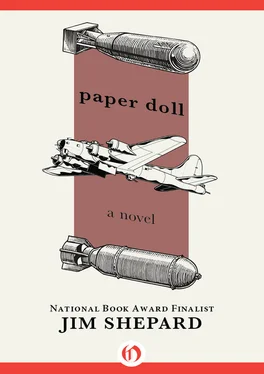They were out of the town but still over the main road, the telegraph wires below looping up and descending with each pole, and there were hedges and then an expanse of tarmac with white numbers and aircraft, camouflaged in gray and green and marked with black crosses.
“We’re over an airfield! We’re over an airfield!” Lewis cried, the first to understand, in the tail. “Get us out of here!”
Gabriel and Bean banked them sharply to the left and Bryant could see spinning away thirty feet below airfield personnel running in all directions, flak batteries swiveling uselessly around as they tried to get the barrels low enough. A Fiesler Storch, a single-engined observation plane as delicate and awkward as a chicken, with a huge ribbed window along its side, turned violently away from them, apparently in its landing pattern, and as it swung behind them Lewis opened fire, his tracer streams lashing across its length. It dove immediately into the ground and exploded and its engine went shooting up over a little hill into some trees.
There were more fields of tan and green lines of cultivation spanning quickly away behind them and he hoped they were safely away from it but Lewis called, “Trouble. Bryant, get out of there, and get to Bean’s gun.”
Gabriel was steady enough now that Bean was able to come all the way back and help Bryant out of the ball. With the hatch sprung he unfolded painfully out into the waist and flexed and rubbed parts of his legs as he scrambled back to the radio room and Bean’s gun.
Closing fast behind them from above was a black Dornier 217, a night fighter, maybe, clearly all the airfield had around with everything else out intercepting the returning bomber stream.
“Let it close, let it close,” Lewis said. “I’m dangling my guns.”
The Dornier started firing early and inaccurately — filled with trainees, Bryant registered — and it closed in until the faceted Plexiglas nose filled his gunsight and he let fly. Lewis had opened up with his twin fifties as well and the three streams of tracers hesitated and flexed and then converged across the Dornier and disintegrated it, the wings and tiny pieces spinning end over end after them as if continuing pursuit.
“We did it!” Bryant called. “We did it!”
“Me-110’s!” Bean called. “Head on. Treetop level.”
The hits smashed into them along their entire length from wingtip to wingtip, it seemed, and Bryant fired as they flashed beside one another over his position, their bellies pale gray and then gone. Lewis did not fire. Bryant could see them hesitate, and then not bank around.
“They’re not coming after us,” he called in. “I think they’re out of gas.” It was, he realized, probably the only reason they’d been returning to the field.
The interphone sputtered and gasped.
“What happened?” Lewis said, his voice faint.
Gabriel chattered and snorted as if he was trying to clear something from his throat. Bean said, “Bobby, you better get up here. Some control wires are flapping around behind me.”
They were hydraulic lines. He found them fluttering and whipsawing right beside his turret, back behind Cooper’s seat. He could make out Gabriel’s head but did not want to see Bean or what was left of Cooper. The hydraulic fluid which allowed operation of the brakes and flaps was slipping away, streaming yellow and thick from the broken lines. He pinched the feeder tubes shut with pliers, and needed more fluid to keep the pressure in the system up. He broke into the flight rations behind Gabriel’s seat, and found a can of apricot juice. He used that. He wrapped the pinched areas with electrical tape.
“Don’t use the brakes or flaps until the very end,” he called to the cockpit, to whoever was flying.
The hydraulic fluid had leaked through his hacked jacket to his bandage, and stung. He looked back down the catwalk toward the radio room, empty, and the waist with Snowberry beyond. His mind unclouded like washed glass, the pain stinging and clear in his arm, and he understood that they weren’t getting back, that this had been more malevolent than they could have imagined, and that he had been, finally, adequate, sort of, with no one to see.
Lewis’s final words struck him and he called Lewis, but no one answered. He climbed back through the bomb bay, through the radio room, past Snowberry, who seemed drowsing as he went by, boots splayed out like a lazy hillbilly.
There was a hatchway to the tail and he crawled into it on his hands and knees, squeezing forward past the assembly for the raised tail wheel. The flexing sheets of steel in the huge hollow tail above him echoed and lightly boomed with a drum-like sound in the wind. The cables along the narrow fuselage were severed, and he was relieved — the interphone was out, and the wind streamed through jagged holes generated from the head-on attacks. In the darkness his gloved hand slipped on ice except that part of the ice was sticky and he knew it was frozen and coagulating blood. He could see light beyond the armored headrest and the glass was smashed outward, sharp-edged and spread with crystals of blood. “Lewis,” he said. “Lewis.”
There were shell cases everywhere, in some parts six inches deep. The sighting glass on the machine guns was shot out. The ammunition boxes were torn and splintered. There were holes through the seat back, from the Me-110’s head-on pass, he knew, and Lewis’s head was back against the headrest but his middle had been destroyed and thrown forward all over the guns he had held.
Bryant had to back out, without turning around, and he was crying, his gloves smeared and gummy with blood, his head down and his rear edging tentatively back until he was out of the hatchway at the end of the waist, curled against the door, crying.
He pulled himself over to Snowberry, who looked on without expression as his head jiggled with the plane’s motion. He lowered his face close and Snowberry looked into his eyes and bubbled some blood from his mouth. He was white and an eye drifted. He reached up and squeezed Bryant’s nose feebly. Bryant understood he was dying. He opened the box of flight rations left for the waist and found an Oh Henry! He held it close to Snowberry’s face and unwrapped it, holding the pebbled bar up for him to see. He broke it in two, and let Snowberry inhale the sugar smell. He put half in Snowberry’s mouth. He put the rest in Snowberry’s hand, and sat with him. Snowberry gave a little artificial grin, showing teeth.
Bean peered close to Snowberry and then tapped Bryant to get up, gesturing toward the waist guns. He picked up the flight rations, puffing, and threw them out the escape hatch. He unslung the right waist gun from its mount and cleared an ammo belt and threw that out as well.
Bryant understood that they were lightening the load and stood and fumbled with the other gun. Bean threw out tool boxes and ammo boxes, and started work on the support housing for the ball turret itself. The ball could be jettisoned and was safer off in a rough landing.
He led Bryant by the hand away from Snowberry to the radio room. Bryant watched him broadcast an alert to British Air Sea Rescue. He saw ocean waves outside the small side window. He helped Bean heft the stacks of transmitters and receivers and tuners back to the waist, and they heaved them out. It took three trips. When they left the radio room, the red warning light was on, signaling them to destroy the radio.
In the cockpit when they returned, the air was unbelievable on the broken open side, Cooper’s side. Gabriel was talking to himself. He told himself that the hydraulics were inoperative and most of the electricals were burned out. He said the inverter was shot and the trim tabs jammed. He said they were losing altitude and their airspeed was way too high. He said they should get Snowberry, because they were going to put it down in the Channel. He saw Bryant crying and he waved him violently away. “A lot of good that does,” he said, nearly hysterical. “A lot of good that does.”
Читать дальше












